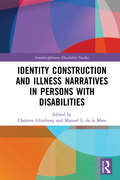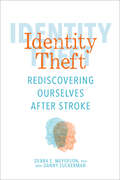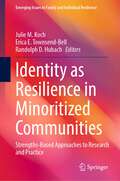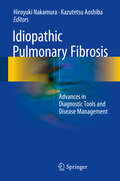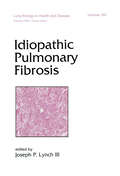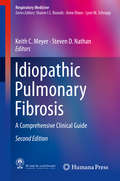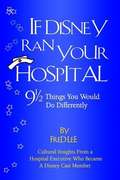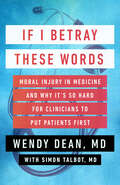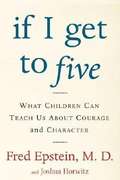- Table View
- List View
Identifying and Understanding the Narcissistic Personality
by Elsa F. RonningstamNarcissists have been much maligned, but according to clinicians who study personality, there are many productive narcissists who succeed spectacularly well in life because they can articulate a vision and make others follow. Elsa Ronningstam, who has been studying and treating narcissists for 20 years, presents a balanced, comprehensive, and up-to-date review of our understanding of narcissistic personality disorder, explaining the range from personality trait, which can be productive, to full-blown disorder, which can be highly destructive. Through fascinating case histories, Ronningstam shows us the inner life of narcissists, the tug of war that exists within them between self-confidence and arrogance on the one hand and painful shame and insecurity on the other. It is the first integrated clinical and empirical guide to assist clinicians in their work with narcissistic patients.
Identity Construction and Illness Narratives in Persons with Disabilities (Interdisciplinary Disability Studies)
by Chalotte GlintborgThis book investigates how being diagnosed with various disabilities impacts on identity. Once diagnosed with a disability, there is a risk that this label can become the primary status both for the person diagnosed as well as for their family. This reification of the diagnosis can be oppressive because it subjugates humanity in such a way that everything a person does can be interpreted as linked to their disability. Drawing on narrative approaches to identity in psychology and social sciences, the bio-psycho-social model and a holistic approach to disabilities, the chapters in this book understand disability as constructed in discourse, as negotiated among speaking subjects in social contexts, and as emergent. By doing so, they amplify voices that may have otherwise remained silent and use storytelling as a way of communicating the participants' realities to provide a more in-depth understanding of their point of view. This book will be of interest to all scholars and students of disability studies, sociology, medical humanities, disability research methods, narrative theory, and rehabilitation studies.
Identity Crisis
by Jefferson BassRenowned forensic anthropologist Bill Bass--founder of the Body Farm--tackles one of his most baffling cases ever in this real-life spellbinder In 1978, 56-year-old Leoma Patterson left a bar in Clinton, Tennessee, and was never seen again. Six months later, a female skeleton was found on a wooded lakeshore in a neighboring county. The bones were consistent with those of the missing woman, and one of Patterson's daughters recognized a ring found at the death scene as her mother's. The bones were buried, and six years later, a relative of Patterson's--one of the men she was last seen alive with--confessed to killing her. Case closed.But the tentative identification--made years before DNA testing was available to confirm it--failed to convince some of Patterson's relatives. And so it was that in 2005 Dr. Bass found himself winding around hairpin curves to the mountainside grave, where he would unearth the disputed remains and collect DNA samples. The forensic twists and turns that followed would test the limits of DNA technology ... and of Dr. Bass's half-century of forensic knowledge.
Identity Politics And The New Genetics
by David Skinner Richard Rottenburg Katharina SchrammRacial and ethnic categories have appeared in recent scientific work in novel ways and in relation to a variety of disciplines: medicine, forensics, population genetics and also developments in popular genealogy. Once again, biology is foregrounded in the discussion of human identity. Of particular importance is the preoccupation with origins and personal discovery and the increasing use of racial and ethnic categories in social policy. This new genetic knowledge, expressed in technology and practice, has the potential to disrupt how race and ethnicity are debated, managed and lived. As such, this volume investigates the ways in which existing social categories are both maintained and transformed at the intersection of the natural (sciences) and the cultural (politics). The contributors include medical researchers, anthropologists, historians of science and sociologists of race relations; together, they explore the new and challenging landscape where biology becomes the stuff of identity.
Identity Theft: Rediscovering Ourselves After Stroke
by Debra Meyerson Danny ZuckermanWinner of the 2019 Silver Nautilus Book Award, Identity Theft centers on Debra&’s experience: her stroke, her extraordinary efforts to recover, and her journey to redefine herself. But she also draws on her skills as a social scientist, sharing stories from several dozen fellow survivors, family members, friends, colleagues, therapists, and doctors she has met and interviewed. By sharing this diversity of experiences, Debra highlights how every person is different, every stroke is different, and every recovery is different. She provides a valuable look at the broad possibilities for successfully navigating the challenging physical recovery—and the equally difficult emotional journey toward rebuilding one&’s identity and a rewarding life after a trauma like stroke.
Identity Unknown: The gripping new Kay Scarpetta thriller for 2024 (Kay Scarpetta #30)
by Patricia CornwellTHE THRILLING NEW KAY SCARPETTA MYSTERY FROM THE WORLDWIDE BESTSELLER'Iconic. Bold. Brilliant. Identity Unknown is hauntingly original, impossibly clever and devilishly daring. Scalpel-sharp storytelling, trademark twists and characters that feel like family, this series is one of the all-time greats' CHRIS WHITAKER, author of Sunday Times bestseller All the Colours of the DarkSummoned to an unnerving, abandoned theme park to retrieve a body, Dr Kay Scarpetta is devastated to learn that the victim is a man she once loved. While teaching in Rome during the early days of her career, Scarpetta had a love affair with acclaimed astrophysicist Sal Giordano that led to a lifelong friendship.The murder scene is bizarre, with a crop circle of petals around the body, and Giordano's skin is strangely red. Scarpetta's niece Lucy believes he was dropped from an unidentified flying craft. Scarpetta knows an autopsy can reveal the dead's secrets, but she is shocked to find her friend seems to have deliberately left her a clue.As the investigators are torn between suspicions of otherworldly forces, and of Giordano himself, Scarpetta detects an explanation closer to home that, in her mind, is far more evil . . .DISCOVER THE SERIES THAT SHAPED THE WORLD OF CRIME FICTION'One of the best crime writers writing today' Guardian'Thirty years on, there's still no other crime writer like her' Sunday Times'Forget the pretenders. Cornwell reigns' Mirror'In a league of her own' Heat
Identity and Health
by David Kelleher Gerard LeaveyExperiences of health and illness are fundamental to how we understand ourselves, and the postmodern obsession with body image has made health even more significant in identity formation. The study of subjective experiences of health and illness can also provide a challenge to traditional objective medical knowledge and, given current healthcare interest in user involvement, can highlight the need for change in health service provision.This book explores the interplay between identity and health, private and public, mind and body. Drawing on new material, and using and exploring innovative biographical and narrative methods, it covers a broad range of identities in relation to health and illness, including race, religion, ethnicity, disability, age, body image, sexuality and gender.Identity and Health will be of great interest to academics, researchers and students of sociology, medical anthropology, health and psychology.
Identity as Resilience in Minoritized Communities: Strengths-Based Approaches to Research and Practice (Emerging Issues in Family and Individual Resilience)
by Julie M. Koch Erica E. Townsend-Bell Randolph D. HubachThis book examines strengths-based approaches to understanding and celebrating diverse populations. It centers on understanding the ways in which minoritized group identities and membership in such communities can serve as sources of strength. The volume explores the varied dimensions of minoritized identities and challenges traditional concepts of what it means to be resilient. It presents research-based and innovative strategies to understand more thoroughly the role of resilience and strengths in diverse populations and families. The book addresses the need to consider affirmative, liberation, and strengths-based models of resilience.Key areas of coverage include:Families of transgender and gender diverse people.The role of chosen family in LGBTQ communities.Latinx LGBTQ families.The Indian Child Welfare Act.Celebration of Black girl voices.Homeschooling as a resilience factor for Black families.Black identity and resilience related to mental health.Black resilience in families.Identity as Resilience in Minoritized Communities is a must-have resource for researchers, professors, and graduate students as well as clinicians and related professionals in developmental psychology, family studies, clinical child and school psychology, cultural psychology, social work, and public health as well as education policy and politics, behavioral health, psychiatry, and all related disciplines.
Identity, Invention, and the Culture of Personalized Medicine Patenting
by Shubha GhoshWhat are the normative implications of patenting in the area of personalized medicine? As patents on genes and medical diagnoses have increased over the past decade, this question lies at the intersection of intellectual property theory, identity politics, biomedical ethics and constitutional law. These patents are part of the personalized medicine industry, which develops medical treatments tailored to individuals based on race and other characteristics. This book provides an overview of developments in personalized medicine patenting and suggests policies to best regulate such patents.
Identity: Mental health and value systems
by Kenneth SoddyTavistock Press was established as a co-operative venture between the Tavistock Institute and Routledge & Kegan Paul (RKP) in the 1950s to produce a series of major contributions across the social sciences. This volume is part of a 2001 reissue of a selection of those important works which have since gone out of print, or are difficult to locate. Published by Routledge, 112 volumes in total are being brought together under the name The International Behavioural and Social Sciences Library: Classics from the Tavistock Press. Reproduced here in facsimile, this volume was originally published in 1961 and is available individually. The collection is also available in a number of themed mini-sets of between 5 and 13 volumes, or as a complete collection.
Identität
by Gerhard DanzerDas Thema Identität ist wahrscheinlich so alt wie die Menschheit, und die Frage nach dem Wer oder Was unserer Existenz hat wohl die Menschen schon vor Jahrtausenden bewegt.Ausgehend von den vielen Spielarten der Identitätssuche verfolgt dieses Buch die diversen Identitäts- und Lebensmuster; daraus erfolgt eine kritische Reflexion des Begriffs der Identität und die Frage, inwiefern wir überhaupt von uns als einem identischen, sich stets gleichbleibenden Wesen sprechen können. es werden philosophische und psychologische Beiträge zur Identitätssuche vorgestellt und verschiedene kulturelle Richtungen und Strategien wie Aufklärung, Bildung, Erziehung, Tiefenpsychologie dazu befragt.Im letzten Teil des Buchs werden einige literarische Beiträge zur Identitätssuche erörtert - anhand von bekannten Werken wird gezeigt, wie Gestalten energisch um ihre Identität ringen und an dieser Aufgabe (beinahe) scheitern.
Ideology and Insanity: Essays on the Psychiatric Dehumanization of Man
by Thomas SzaszThis book is a collection of the earliest essays of Thomas Szasz, in which he staked out his position on “the nature, scope, methods, and values of psychiatry.” On each of these issues, he opposed the official position of the psychiatric profession. <p><p>Where conventional psychiatrists saw themselves diagnosing and treating mental illness, Szasz saw them stigmatizing and controlling persons; where they saw hospitals, Szasz saw prisons; where they saw courageous professional advocacy of individualism and freedom, Szasz saw craven support of collectivism and oppression.
Idiocy, Imbecility and Insanity in Victorian Society: Caterham Asylum, 1867–1911 (Mental Health in Historical Perspective)
by Stef EastoeThis book explores the understudied history of the so-called ‘incurables’ in the Victorian period, the people identified as idiots, imbeciles and the weak-minded, as opposed to those thought to have curable conditions. It focuses on Caterham, England’s first state imbecile asylum, and analyses its founding, purpose, character, and most importantly, its residents, innovatively recreating the biographies of these people. Created to relieve pressure on London’s overcrowded workhouses, Caterham opened in September 1870. It was originally intended as a long-stay institution for the chronic and incurable insane paupers of the metropolis, more commonly referred to as idiots and imbeciles. This purpose instantly differentiates Caterham from the more familiar, and more researched, lunatic asylums, which were predicated on the notion of cure and restoration of the senses. Indeed Caterham, built following the welfare and sanitary reforms of the late 1860s, was an important feature of the Victorian institutional landscape, and it represented a shift in social, medical and political responsibility towards the care and management of idiot and imbecile paupers.
Idiopathic Granulomatous Mastitis
by Hande Koksal Naim KadoglouIdiopathic Granulomatous Mastitis (IGM) is an uncommon benign chronic inflammatory condition of the breast, occurring most commonly in women of childbearing age with a higher incidence in certain geographical areas. The aetiology is uncertain and diagnosis is difficult; it is usually made by exclusion. The clinical and radiological features often overlap with those of other benign diseases of the breast in women, but also with those of breast cancer, which is why early diagnosis is necessary to allow timely intervention when required. Its evolution is unpredictable and there is currently no consensus on the optimal treatment for these patients.The aim of this book is to provide readers with an overview of the data available to date on this unknown and controversial disease. General surgeons, breast surgeons, general practitioners, internal medicine specialists, pathologists, radiologists, rheumatologists, immunologists and dermatologists will certainly benefit from this practical guide.
Idiopathic Intracranial Hypertension Explained: A Guide for Patients and Families
by Kyle M. FargenThis book provides a valuable guide to understanding idiopathic intracranial hypertension (IIH), which is a very complex and painful disease. It is a chronic, often disabling condition resulting in headaches, visual loss, and ringing in the ears. This condition was thought to be rare but is becoming much more common, especially as the population becomes more overweight. Patients with this condition often suffer from intractable headaches with poor quality of life. Very few physicians specialize in this condition, and as a result, there is almost no information or resources available to those trying to understand this condition. The text is designed to take very complex neurosurgical anatomy, principles, and treatments and reduce them down into simple principles. The book contains 12 chapters, each organized into distinct sections. All chapters also contain key points from those paragraphs to summarize useful take home messages.Written by an expert specializing in this debilitating condition, Idiopathic Intracranial Hypertension Explained serves as a valuable guide towards understanding and treating IIH. The ultimate goal is to empower patients and families with knowledge about the disease.
Idiopathic Pulmonary Fibrosis
by Hiroyuki Nakamura Kazutetsu AoshibaFrom epidemiology and pathogenesis to disease management, this book reviews our current understanding of and provides up-to-date information of Idiopathic Pulmonary Fibrosis (IPF). A subtype of Idiopathic Interstitial Pneumonias (IIP), IPF is one of the most elusive and intractable respiratory disease to date and its triggering factors remain unclear. However, new developments such as serum markers that are highly specific to IPF (i. e. KL-6, SP-A, and SP-D), the establishment of systematic diagnostic imaging (HRCT) and accumulated reports of treatment using an antifibrotic agent (pirfenidone) are slowly improving our understanding of the disease. Edited by an established authority in the field and written by experts, this book will be valuable to not only to beginning learners but also to physicians, instructors and researchers whose work involves IIPs. With each chapter exploring critical questions, with unresolved issues and future prospects, the book offers a valuable resource for understanding issues such as the newly proposed entity of interstitial pneumonia with emphysema (combined pulmonary fibrosis and emphysema: CPFE) and the mechanism of how so many IIP sufferers develop lung cancer.
Idiopathic Pulmonary Fibrosis
by Keith C. Meyer Steven D. NathanIdiopathic Pulmonary Fibrosis: A Comprehensive Clinical Guide delivers a concise review of our current understanding of disease pathogenesis and provides current evidence in the medical literature regarding its diagnosis and management. Each chapter includes key points and a summary aiming to update clinicians about various issues concerning the diagnosis and management of IPF. In addition to outlining the current state of knowledge, each chapter also provides a summary of ongoing research and identifies the needs for future research in the field. Idiopathic Pulmonary Fibrosis: A Comprehensive Clinical Guide is an important new text that provides its readers with a better understanding of the pathobiology and natural history of IPF as it continues to evolve.
Idiopathic Pulmonary Fibrosis (Lung Biology in Health and Disease)
by Joseph P. Lynch IIIA discussion of the epidemiology, clinical features, and differential diagnoses of idiopathic pulmonary fibrosis (IPF). Key topics include the role of polymorphonuclear leukocytes in the pathogenesis of pulmonary fibrosis, and current treatment options, including medical therapy and lung transplantation.
Idiopathic Pulmonary Fibrosis: A Comprehensive Clinical Guide (Respiratory Medicine Ser. #9)
by Keith C. Meyer Steven D. NathanThis book is a comprehensive guide to our current understanding of idiopathic pulmonary fibrosis (IPF), its disease pathogenesis, genetic underpinnings, diagnosis, and management. Since the first edition, many new developments have occurred in the understanding and management of this serious disease, revising our understanding of how it presents, manifests, and reacts to certain treatments. This second edition is fully updated with six new chapters by our team of international, expert authors. New topics include: classification of interstitial lung disease, pulmonary function tests in IPF, biomarkers, clinical phenotypes, mimics, and a discussion of clinical trials. Each chapter additionally includes a brief summary of ongoing research and potential future directions. Idiopathic Pulmonary Fibrosis: A Comprehensive Clinical Guide, Second Edition is an invaluable resource for clinicians who desire a deeper understanding of IPF in order to better help their patients.
Idiot Brain: What Your Head Is Really Up To
by Dean BurnettA neuroscientist's delightful tour of our mysterious, mischievous, entirely fallible gray matter. It's happened to all of us at some point. You walk into the kitchen, or flip open your laptop, or stride confidently up to a lectern, filled with purpose—and suddenly haven't the foggiest idea what you’re doing. Welcome to your idiot brain. Yes, it is an absolute marvel in some respects—the seat of our consciousness, the pinnacle (so far) of evolutionary progress, and the engine of all human experience—but your brain is also messy, fallible, and about 50,000 years out-of-date. We cling to superstitions, remember faces but not names, miss things sitting right in front of us, and lie awake at night while our brains replay our greatest fears on an endless loop. Yet all of this, believe it or not, is the sign of a well-meaning brain doing its best to keep you alive and healthy. In Idiot Brain, neuroscientist Dean Burnett celebrates blind spots, blackouts, insomnia, and all the other downright laughable things our minds do to us, while also exposing the many mistakes we've made in our quest to understand how our brains actually work. Expertly researched and entertainingly written, this book is for everyone who has wondered why their brain appears to be sabotaging their life, and what on earth it is really up to.
If Disney Ran Your Hospital: 9 1/2 Things You Would Do Differently
by Fred LeeAlthough this book was written with hospital managers in mind it should also be appealing to staff at all levels. It is filled with personal examples and stories that will stimulate conversations on creating the ideal patient experience. It is fairly comprehensive and includes the principles most likely to improve patient perceptions. It reflects a deeper approach to clinical practices by focusing on ways of thinking rather than prescribing actions to implement. Action follows thought, and if our thinking is changed we will find the ways to create a culture that inspires caregivers and reshapes the patient's experience toward a more trusting and compassionate environment for healing to take place.
If I Betray These Words: Moral Injury in Medicine and Why It's So Hard for Clinicians to Put Patients First
by Wendy Dean Simon TalbotAn incredibly important and captivating book for patients, families, and clinicians detailing how we&’re all hurt by corporate medicine&“Wendy Dean diagnoses the dangerous state of our healthcare system, illustrating the thumbscrews applied to medical professionals by their corporate overlords… Required reading for all stakeholders in healthcare.&” — Danielle Ofri, MD, PhD, author of When We Do Harm: A Doctor Confronts Medical ErrorOffering examples of how to make medicine better for the healers and those they serve, If I Betray These Words profiles clinicians across the country who are tough, resourceful, and resilient, but feel trapped between the patient-first values of their Hippocratic oath and the business imperatives of a broken healthcare system.Doctors face real risks when they stand up for their patients and their oath; they may lose their license, their livelihood, and for some, even their lives.There&’s a growing sense, referred to as moral injury, that doctors have their hands tied – they know what patients need but can&’t get it for them because of constraints imposed by healthcare systems run like big businesses.Workforce distress in healthcare—moral injury—was a crisis long before the COVID-19 pandemic, but COVID highlighted the vulnerabilities in our healthcare systems and made it impossible to ignore the distress, with 1 in 5 American healthcare workers leaving the profession since 2020, and up to 47% of U.S. healthcare workers now planning to leave their positions by 2025.If I Betray These Words confronts the threat and broken promises of moral injury – what it is; where it comes from; how it manifests; and who&’s fighting back against it. We need better healthcare—for patients and for the workforce. It&’s time to act.
If I Get To Five
by Fred Epstein Joshua HorwitzThroughout his career as a pioneering pediatric neurosurgeon, Dr. Fred Epstein's young patients have been his most important teachers and trusted guides.
If I Get to Five: What Children Can Teach Us About Courage and Character
by Fred Epstein Josh HorwitzA world-renowned pediatric neurosurgeon shares the lessons of courage, compassion, and resilience that he's learned from his exceptional young patientsIf I Get to Five is a one-of-a-kind book by a one-of-a-kind human being. The medical world knows him as Fred Epstein, M.D., the neurosurgeon who pioneered life-saving procedures for previously inoperable tumors in children. His patients and their families know him simply as Dr. Fred, the "miracle man" who has extended them both a healing hand and an open heart. "I simply can't accept the idea of kids dying," is how Epstein explains his commitment to saving patients. As a child, he had to overcome severe learning disabilities to realize his dream of becoming a doctor. Later, as the world's leading pediatric neurosurgeon, he did whatever it took to rescue children that other doctors had given up on. Epstein credits his young patients as his most important teachers. "We tend to think of children as fragile, little people," he writes. "To me, they're giants." If I Get to Five relates the unforgettable experiences he's shared with children-lessons in courage, compassion, love, and hope-that we can all draw on to overcome adversity at any stage of life. In If I Get to Five, Epstein meditates on these lessons at a time when they parallel his own experiences, as he recovers from a near-fatal head injury.If I Get to Five is a riveting profile of courage and compassion. No one who reads this remarkable book will ever look at children-or adversity-in the same way.
If I Only Had a Brain: Deconstructing Brain Injury (New Approaches in Sociology)
by Mark SherryThis book offers a rich, insider's viewpoint of the lived experience of brain injury. Sherry, a survivor of brain injury himself, uses a cross-disciplinary theoretical approach (drawing upon the social and medical models of disability and combining them with lessons from feminism, queer theory, postcolonial and postmodern literature) to frame an enriching narrative about the lived experience of brain injury.

